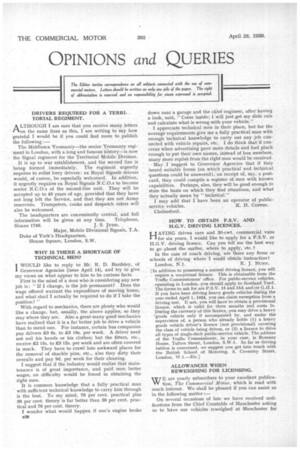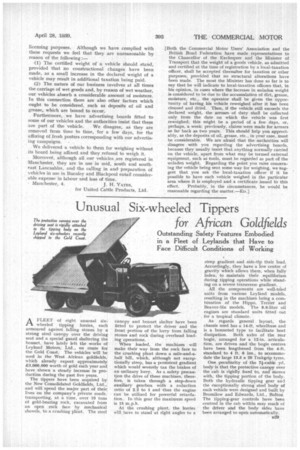OPINIONS and QUERIES
Page 34

Page 35

If you've noticed an error in this article please click here to report it so we can fix it.
DRIVERS REQUIRED FOR A TERRI. TORIAL REGIMENT.
ALTHOUGH I am sure that you receive many letters on the same lines as this, I am writing to say how grateful I would be if you could find room to publish the following :—
The Middlesex Yeomanry—the senior Yeomanry regiment in London, with a long and famous history—is now the Signal regiment for the Territorial Mobile Division.
It is up• to war establishment, and the second line is being formed immediately. The regiment urgently requires to enlist lorry drivers : ex Royal Signals drivers would, of course, be especially welcomed. In addition, it urgently requires ex Royal Signals N.C.O.s to become senior N.C.O.s of the second-line unit. They will be accepted up to 45 years of age, provided that they have not long left the Service, and that they are not Army reservists. Trumpeters, cooks and despatch riders will also be welcomed.
The headquarters are conveniently central, and full information will be given at any time. Telephone, Sloane 1746. J. S. jUDD, Major, Mobile Divisional Signals, T.A. Duke of York's Headquarters, Sloane Square, London, S.W.
WHY IS THERE A SHORTAGE OF TECHNICAL MEN?
I WOULD like to reply to Mr. R. D. Bardsley, of
Grosvenor Agencies (issue April 14), and try to give my views on what appear to him to be curious facts.
First in the mind of a man who is considering any new job is : "If I change, is the job permanent? Does the wage offered warrant the expenditure of moving home, and what shall I actually be required to do if I take the position? "
With regard to mechanics, there are plenty who would like a change, but, usually, the above applies, so they stay where they are. Also a great many good mechanics -have realized that it is a far better job to drive a vehicle than to mend one. For instance, certain bus companies pay drivers 43 6s. to 23 10s. per week. A driver need not soil his hands or his clothes; but the fitters, etc.. receive 22 15s. to 23 12s. per week and are often covered in muck. They have to crawl into awkward places for the removal of shackle pins, etc., also they dirty their overalls and pay 9d. per week for their cleaning.
I suggest that if the industry would realize that maintenance is of great importance, and paid men better wages, no difficulty would be found in obtaining the right men.
It is common knowledge that a fully practical man with sufficient technical knowledge to carry him through is the best. To my mind, 70 per cent. practical plus 30 per cent. theory is far better than 30 per cent, practical and 70 per cent. theory.
I wonder what would happen if one's engine broke B28 down near a garage and the chief engineer, after having a look, said, "Come inside; I will just get my slide rule and calculate what is wrong with your vehicle."
I appreciate technical men in their place, but for the average requirements give me a fully practical man with enough technical knowledge to carry out any job connected with vehicle repairs, etc. I do think that if concerns when advertising gave more details and had pluck enough to put their own names, instead of box numbers, many more replies from the right men would be received.
May I suggest to Grosvenor Agencies that if they issued suitable forms (on which practical and technical questions could be answered), on receipt of, say, a -postcard, they could compile a register of men with known capabilities. Perhaps, also, they will be good enough to state the basis on which they find situations, and what they actually mean by "technical."
I may add that I have been an operator of public
service vehicles. K. H. COPPLN. Chelmsford.
HOW TO OBTAIN P.S.V. AND H.G.V. DRIVING LICENCES.
H1AVING driven cars and 30-cwt. commercial vans for six years, I would like to apply for a P.S.V. or H.G.V. driving licence. Can you tell me the best way to go about the matter, where to apply, etc.?
In the case of coach driving, are there any firms or schools of driving where I could obtain instruction?
London, N.1. E. J. NurnsT.
[In addition to possessing a normal driving licence, you will
. require a vocational licence. This is obtainable from the Traffic Commissioners' office. For public-service vehicles, operating in London, you should apply to Scotland. Yard. The forms to ask for are P.S.V. 15 and 15A and/or G.H.I. If you have been driving heavy goods vehicles during the year ended April 1. 1934, you can claim exemption from a driving test. If not, you will have to obtain a provisional licence, which is valid for three months and costs Is. During the currency of this licence, you may drive a heavy 'goods vehicle only if accompanied by, and under the supervision of, a person who already holds (1) a heavy goods vehicle driver's licence (not provisional) covering the class of vehicle being driven, or (2) a licence to drive all types of single-deck public-service vehicle. The address of the Traffic Commissioner, in your case, is Romney House, Tufton Street, London, S.W.1. So far as driving tuition is concerned, we suggest you get into touch with the British School of Motoring, 5, Coventry Street, London, W.1.—En.]
ALLOWANCES WHEN REWEIGHING FOR LICENSING.
wi E are yearly subscribers to your excellent publicaVV tion, The Commercial Motor, which is read with much interest. We shall be pleased if you can assist us in the following matter:—
On several occasions of late we have received notifications from the Chief Constable of Manchester asking us to have our vehicles reweighed at Manchester for.
licensing purposes. Although we have complied with these requests we feel that they are unreasonable by reason of the following :— (1) The certified weight of a vehicle should stand, provided that no constructional changes have been made, as a small increase in the declared weight of a vehicle may result in additional taxation being paid.
(2) The nature of our business involves at all times the carriage of wet goods and, by reason of wet weather, our vehicles absorb a considerable amount of moisture. In this connection there are also other factors which ought to be considered, such as deposits of oil and grease, which are bound to occur.
Furthermore, we have advertising boards fitted to some of our vehicles and the authorities insist that these are part of the vehicle. We disagree, as they are removed from time to time, for a few days, for the affixing of fresh posters corresponding with our advertising campaigns. • We delivered a vehicle to them for weighing without its board being affixed and they refused to weigh it. Moreover, although all, our vehicles are registered in Manchester, they are in use in mid, south and southeast Lancashire, and the calling in ant preparation of vehicles in use in Burnley and Blackpool entail considerable expense in labour and loss of time.
Manchester, 4. J. H. YATES, Both the Commercial Motor Users' Association and the British Road Federation have made representations to the Chancellor of the Exchequer and the Moister of Transport that the weight of a goods vehicle, as admitted and certified at the time of registration by a local-taxation officer, shall be accepted thereafter for taxation or other purposes, provided that no structural alterations have been made. The most the Minister has done so far is to say that he will indicate to local-taxation officers that, in his opinion, in cases where the increase in unladen weight is considered to be due to the accumulation of dirt, grease, moisture, etc., the operator shall be given the opportunity of having his vehicle reweighed after it has been cleaned and dried. Then, if the vehicle still exceeds the declared weight, the arrears of duty shall be collected only from the date on which the vehicle was first reweighed; this might be a period of a few days, or, perhaps, a week: previously, claims were made for arrears as far back as two years. This should help you appreciably, as the deposits of oil, grease, etc., in your case, must be considerable. We are afraid that the authorities will disagree with you regarding the advertising boards, because they usually insist that anything normally carried on the vehicle, apart from what may be termed external equipment, such as tools, must be regarded as part of the unladen weight. Regarding the point you raise concerning the vehicle being sent some way for weighing, we suggest that you ask the local-taxation officer if it be possible to have each vehicle weighed in the particular area where it is employed and a certificate issued to this effect. Probably, in the circumstances, he would be reasonable regarding the matter.—ED.]












































































